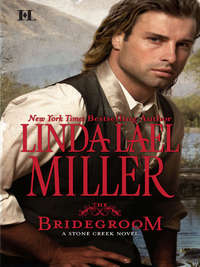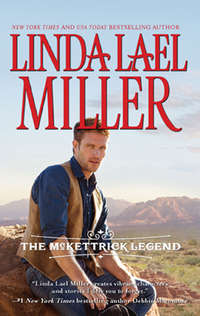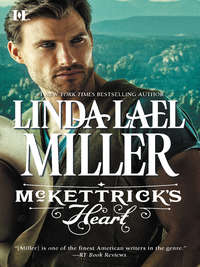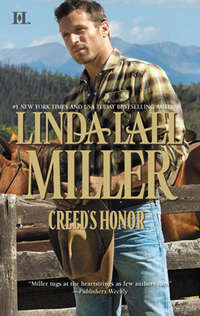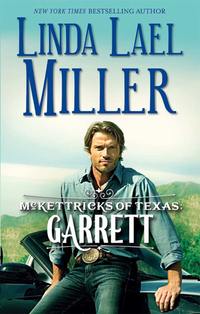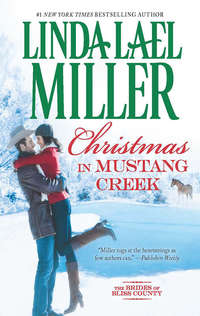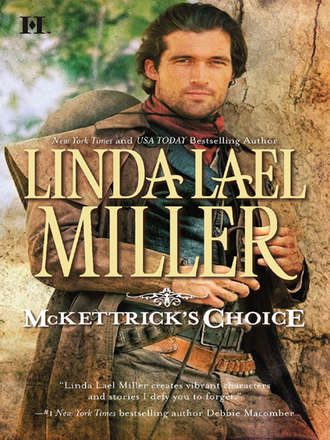
Полная версия
McKettrick's Choice
The Englishman spared a thin smile. “I hear you sold out. I’m disappointed, John. I would have given you a good price.”
John smiled back and spat again. “I’d sooner deed this place over to the devil,” he said. “And you were planning on buying this spread from the bank, pennies on the dollar.”
Templeton shifted in the saddle. Cradled the rifle as gently as a babe just drawing its first breath. “That fellow McKettrick. Is he really your son?”
“Good as,” John said.
“I’ve been expecting him to pay me a call.”
“He’s had better things to do.”
With a mocking air, Templeton put a hand to his heart, fingers splayed, as though to cover a fresh wound. The rifle barely moved. The Englishman’s smile sent that prickle rolling along John’s spine again. “Now that was an unkind thing to say,” Templeton drawled. His gaze moved past John, tracking Tillie and the mule in the distance, like a snake about to spring at a field mouse. John’s aging heart lurched over a beat. “Looks as if you’re pretty hard up for ranch hands.”
John sat up straighter in the saddle and fondled the handle of the .45 strapped to his hip just to draw Templeton’s eyes back to him and, therefore, off Tillie. “That’s the truth,” he allowed. “Holt’s hiring, though. Like as not, he’ll have that bunkhouse filled in no time.”
“You tell your…son that I’d like a word with him. I’ll be receiving whenever he chooses to make a visit.” Templeton paused, smiled at John’s .45, like it was a toy whittled out of wood instead of a Colt, and sheathed his rifle. “Best if it’s soon, though. I’m an impatient man.”
“‘Receiving,’ is it?” John countered lightly. “Sounds pretty fancy.”
Templeton was watching Tillie again. “Just tell him what I said.”
“Oh, I surely will.” John maneuvered his horse to block Templeton’s view of the girl. “I doubt Holt’ll take kindly to it, though. My guess is, he’ll wait for you to come to him.”
Templeton reined his fine Irish horse away, toward home. “He won’t like it if I do,” he said, and before John could answer, he rode off into the trees.
John gulped back the bile that rose into his throat, then turned and headed down the hillside, toward the draw. “Tillie!” he called. “You get yourself back to the house now, and start supper!”
GABE STOOD with his back to the bars of the new cell, staring out the window. The rasping of a saw rode the air, along with the steady tattoo of hammers. The gallows was well underway.
“I don’t suppose you’ve heard back from the governor,” Gabe said, without turning around.
Holt took off his hat, ran a hand through his hair. “No,” he admitted. “I stopped by the telegraph office on my way here.”
“Most likely that wire never went out, any more than the one Frank sent to you did.”
“I’ll ride up to Austin if I don’t hear by tomorrow,” Holt said. He felt every blow of those hammers as if they’d struck his bare bones instead of the new and fragrant lumber of a hangman’s platform.
Gabe didn’t speak. It was clear he wasn’t holding out much hope.
“Is there anything in particular you want me to do?” Holt asked quietly. “Besides get you out of here, I mean?”
At last, Gabe faced him. “I’ve been worrying about Melina. Somebody ought to tell her that I’m not staying away on purpose.” He paused, rubbed his chin with one hand. “She’s carrying my baby, Holt.”
Holt wanted to avert his eyes, because his friend’s pain was a hard thing to look upon, but he didn’t. “Where will I find her?”
“Waco,” Gabe answered, relaxing a little. “Her last name is Garcia. Last I knew, she was doing laundry for a rich rancher’s wife. Parkinson, I think they call themselves.”
“Done,” Holt said.
Gabe’s throat worked. “If anything happens—”
“Nothing,” Holt interrupted, “is going to happen. But I’ll tell her, Gabe.”
“She’ll want to come here, to San Antonio. You’ve got to talk her out of that.”
Holt’s grin felt more like a grimace. “You don’t know much about women if you think I could say anything to change her mind, once it’s made up.”
Gabe prowled across the space between them, gripped the bars in both hands. The skin of his face was taut, and his eyes glittered with savage conviction. “There’s nothing for her here,” he said. “They’ll make a whore of her.”
“And you think I’d stand by and see that happen?”
Gabe let out his breath, nodded toward the other end of the corridor, where the jailer waited. “I had a hundred dollars when they brought me here. They took it, along with my knife and my boots. You get that money and fetch it to Melina.”
Holt nodded, wishing there was more he could say, more he could do.
“How’s John?” Gabe asked, and the change of subject was welcome.
“He’s holding up,” Holt answered. “I hired a man yesterday and sent six more out to the place today.” He paused, unsettled. “You remember that kid who used to tend the horses back when we rode with the Rangers? Mac Kahill?”
Gabe hesitated, thinking, then said, “Sure. Sneaky little bastard. I caught him going through my saddlebags one time.”
Holt reached back, rubbed the nape of his neck. “He’s working for me now.”
Gabe narrowed his eyes. “You watch him, Holt. Watch him real close.”
Holt didn’t reckon he’d have time to watch anybody, real close or otherwise, with all he had to do to get that ranch back on sound footing. There were cattle to buy, which meant he’d have to run a herd up from Mexico, and he needed at least another dozen men for a drive like that. He ought to find Frank, and go to Austin to meet with the governor. And then there was Melina, up in Waco.
All the while, Gabe’s life was getting shorter with every tick of the clock in the town square.
In the back of his mind, Holt heard Angus McKettrick’s voice. It’s there to do, boy. Best leave off worrying and get on with the business at hand.
God, what he wouldn’t give to have his pa and brothers with him right now.
“It might be a few days before I can get back here to see you,” he said aloud. “You getting the meals from the hotel?”
Gabe nodded, managed a semblance of the old grin. “It’s a lot of food, Holt. I reckon I can count on that coffin being a real tight fit.”
“You won’t be needing a coffin,” Holt said. “Not for a long while, anyway.”
Gabe studied him. “You losing your sense of humor, old friend?”
“That’s a peculiar question, coming from you. Talking about coffins, and your woman ending up a whore.”
The other man sighed, ran his palms down the legs of his buckskin trousers. “Old Cap’n Jack, he’d have a thing or two to say about all this, wouldn’t he?”
The mention of the seasoned Ranger cheered Holt considerably. “He surely would,” he said. “And most of it would take the paint off a wall.”
Gabe gave a low guffaw. “Yes, sir. Call us a pair of down-in-the-mouth yellow-bellied tit babies, probably. Give us the sole of his boot.”
Holt laughed, heartened. He put a hand through the bars, gripped Gabe’s shoulder. “Don’t pay too much mind to that gallows out there,” he counseled. “One day real soon, we’ll burn it for firewood and dance around the flames, whooping like Comanches.”
“‘Like Comanches’?” Gabe retorted. “I am a Comanche, White Eyes.”
“Then act like one,” Holt said, turning to go.
“Son of a bitch,” Gabe called, in cheerful farewell. Holt laughed.
It took some doing, but he got Gabe’s hundred dollars out of the jailer.
He’d stop by the ranch, to look in on John and Tillie and the yellow dog, then ride for Waco. With luck, he’d be there by mid-day tomorrow.
CHAPTER 10
THERE WAS A THIRD PLACE set at the dining room table, and the sound of masculine laughter came from behind the closed doors of the judge’s study. Lorelei marched to the kitchen and pushed the door open with the flat of her hand.
“Angelina!”
The other woman was just setting a pan of biscuits in the oven. She looked back at Lorelei over one plump shoulder. “Sí?” she asked innocently.
“I’m having supper in my room tonight. I refuse to sit across the table from Creighton Bannings!”
Angelina smiled as she straightened, wiping her hands on her apron. “How was the Ladies’ Benevolence Society meeting?”
The reminder of her summary dismissal made Lorelei flinch, but she recovered almost immediately. “I was asked to leave,” she said, setting her shoulders. “I’m thinking of starting my own group, just to spite them.”
Angelina drew herself up, indignant. “Hateful old hens,” she muttered. “I ought to make them all come down with the grippe.”
Despite the unseemly reference, Lorelei took a plate from the cupboard, planning to fill it with whatever Angelina had made for supper and sneak up the back stairs. “Start with Mrs. Malvern,” she said lightly, then lowered her voice to a whisper and cast a glance over one shoulder as the laughter in the study swelled again. “She’s Creighton’s cousin, you know. She’s the one who threw me out of the society.”
Angelina checked the kettle of potatoes boiling on the back of the stove, then peered into the warming oven at the platter of fried chicken. The heat in the room was almost palpable.
“Put that plate back where you found it,” Angelina said. “It isn’t Bannings in there with your father. It’s the banker, Mr. Sexton.”
Lorelei was both relieved and unsettled. Mr. Sexton was not the jovial sort, and neither was her father. What were they laughing about in there?
“Since when does the judge socialize with clerks?”
Angelina met her gaze. “Since today,” she said meaningfully.
Lorelei smoothed her hair, then her skirts. Sexton managed her father’s accounts, as well as Lorelei’s inheritance from her maternal grandfather. “I guess I’d better greet our guest,” she said.
Angelina merely nodded.
A few moments later, after straightening her hair and skirts again, Lorelei tapped circumspectly at the study door.
“Come in,” the judge called.
Lorelei took a deep breath, wondering if her father had heard about her ousting from the society, and turned the latch.
Mr. Sexton stood, tugging at his tight collar, and tried to smile. “Miss Fellows,” he said, in greeting. Her father regarded her smugly from the chair behind that half-acre desk of his.
Lorelei summoned up a smile. “Good evening, Mr. Sexton.”
“Tell her,” urged the judge.
Sexton flushed. Whatever he’d been laughing about earlier must have been far from his mind, because he looked miserable, and not just from the cloying heat.
“It’s about the property you inherited,” he said.
“What property?” Lorelei asked.
“Why, the ranch,” Sexton replied, after a quick glance at the judge. “The hundred acres downriver.” He fiddled with his collar again. “An offer of purchase has been made.”
Lorelei was confounded. She looked at her father, but his face gave away nothing, as usual. “It’s mine to sell?” she asked.
The judge cleared his throat. “Not precisely. But your signature is required. Just a formality.”
“I want to see the place first.”
Her father sighed. “There is no point in that, Lorelei,” he said. “It’s just an old cabin, surrounded by scrub brush and rattlesnakes.”
“Mr. Templeton is prepared to be very generous,” Sexton put in nervously, and got a quelling glare from the judge for his trouble.
“I’m sure he is,” Lorelei said, “but I’m not signing anything until I see that land with my own eyes.”
The judge pinched the bridge of his nose. “I should have known you would be difficult about this,” he said.
“Yes,” Lorelei agreed. “You should have.”
He glowered at her. “Will you excuse us for a few moments, Mr. Sexton?”
Sexton fled with such haste that Lorelei half expected to see a little cloud of dust trailing behind him. The study door closed with a crisp catch of the latch.
“Why didn’t you tell me about this land?” Lorelei asked.
“You are a woman,” the judge replied wearily. “It was of no concern to you.”
“Until you decided to sell it,” Lorelei pointed out.
“The sale will provide a substantial dowry,” the judge reasoned, but with an edge of impatience in his voice.
“God knows, you’ll need one to get a husband.”
“I don’t want a husband.”
“You have made that quite clear. Nonetheless, my dear, you will have one.”
“Tell me about the ranch.”
Another sigh, this one long-suffering. “It belonged to your mother’s family. If William had lived, the place would have gone to him. Your grandfather’s will stated that, should William fail to survive, the land would be yours.”
“I’m not surprised that I wasn’t consulted,” Lorelei said glumly. “After all, I am only a woman.” The judge would simply have appropriated the estate if he’d been able to do so, which meant there was something he wasn’t telling her.
Her father hoisted himself from his chair. His lips had a bluish tinge, and there was a strange pallor to his face. “Please, Lorelei. For once in your life, do not argue with me. Mr. Sexton has brought the documents.” He shoved a pile of papers toward her without lifting them from the desktop.
Lorelei took a step toward him. “You don’t look well. Perhaps I should ask Angelina to send Raul for the doctor.”
“Never mind the damn doctor!” the judge shouted, collapsing back into his chair. “Sign the papers!”
Lorelei bit her lower lip. Sometimes, she wished she were more tractable.
“No,” she said. “Absolutely not.”
HOLT RODE INTO Waco about an hour after sunup. A freight wagon jostled by, and the driver touched his hat brim in greeting. Two prostitutes gossiped in front of the Blue Bullet Saloon, pausing to regard Holt through a haze of tobacco smoke, and a Chinaman trotted along the sidewalk, a broomstick braced across his narrow shoulders, yokelike, with a huge covered basket suspended from either end. A dead man—shot through the chest if the pattern of dried blood was any indication—leaned against the wall beside the undertaker’s door, strapped to a board. A crude sign dangled from a nail above his head. The Wages Of Sin Is Death.
Holt had seen worse things, especially while riding with the Rangers, but the sight sent a shiver down his spine just the same. He couldn’t help thinking of Gabe.
He spotted a livery stable and headed in that direction. Gabe had said Melina was working for a rancher’s wife, which meant he wasn’t likely to find her in town, but his horse was played out, in need of water, feed and a few hours’ rest. He would see to the Appaloosa first, then scare up some breakfast for himself. With any luck, the folks in the restaurant would steer him in the right direction.
He’d just taken a chair by the window and ordered up a plate of eggs, fried potatoes and sausage when Captain Jack Walton himself ambled in. Grizzled and wiry, the man was deceptively small. Holt had seen him take on Comanches two at a time and come out of it with his hair still on and his hide unmarked.
Holt blinked, sure he was seeing things, and set down his mug of coffee.
Captain Jack laughed. “Thought I was dead, didn’t you?” he drawled, taking off his round-brimmed hat and easing himself into the chair across from Holt’s.
“Hell, yes,” Holt said, recovering, taking in the Captain’s thinning gray hair and hard, watchful eyes. “Fact is, I’m still not sure you’re real.”
Walton’s skin was leathery from the Texas sun, and his hands were age-spotted, the fingers clawlike, yet still, Holt would have bet, as quick to the trigger as ever. “I had the same thought about you, when I saw you ride in. That’s a fine-looking Appaloosa you’ve got there.”
Holt nodded. He didn’t know how to make small talk, not with the Captain, anyhow. “Thanks,” he said, at some length, noting the star pinned to the old man’s vest.
Walton signaled the waitress, and she hurried over with a blue enamel coffeepot and an outsized cup. Evidently, the Captain still liked his brew.
“What brings you to Waco?” he asked, after adding half a pound of sugar and taking an appreciative slurp.
“I’m looking for a woman called Melina Garcia,” Holt said, wondering if the Captain had been the one to put a bullet in that outlaw over at the undertaker’s and then display the corpse as a deterrent to those with criminal inclinations. He was a man to take harsh measures when he deemed them appropriate, which was often.
The Captain arched one eyebrow. “Gabe Navarro’s woman?”
Holt’s stomach soured, and he regarded his unfinished breakfast with mournful resignation. “Yes.”
Walton leaned forward. “You the bearer of bad tidings, Mr. Cavanagh?” he asked. “Last I heard, you was up in the Arizona Territory someplace, building yourself another ranch.”
“Gabe’s been tried and sentenced to hang, down in San Antonio,” Holt said. The details about Arizona could wait.
The Captain narrowed his eyes. “The hell you say.”
“I would have thought you’d have heard about it,” Holt said. “Word like that usually spreads fast.”
“I’ve been in Mexico the last little while. Just came up here to collect a bounty or two.”
“‘The wages of sin is death’?”
The Captain smiled. He still had all his teeth. “You seen him, did you? Name was Jake Green. Robbed a freight wagon between here and Austin, and shot the driver in cold blood.”
Holt glanced at the star on Walton’s chest. “Bounty hunters wear badges now?”
“They do if the money’s right,” the Captain answered. He settled back in his chair, took a thoughtful sip of his coffee. “You gonna eat that grub or leave it sit?”
Holt shoved the plate across the table, along with his fork and knife.
The Captain speared a sausage link and ate it in two bites. Still chewing, he said, “Melina’s working on the Parkinson place, about five miles west of town. I’d be careful how you broach the subject of Gabe if I was you. She’s brewing up a baby, and she’s none too happy with him right now.”
“I’ll take my chances,” Holt said.
The Captain grinned and tucked into the eggs. “You always were a reckless sum-bitch,” he allowed. “It’s good to see you. Brings the good old days to mind.”
The waitress returned, refilled the coffee cups and left again.
“The good old days,” Holt reminisced with a wry smile. “Sleeping on the ground. Eating jerky and jackrabbit for every meal. Fighting Comanches for every inch of ground we crossed. And all for less money than Melina probably makes washing Mrs. Parkinson’s bloomers.”
The Captain gave a hoot of laughter. “Made you tough,” he said.
“You ever thought of going to San Antonio?” Holt inquired.
Walton speared another link of sausage. “Not until you said Gabe was in the hoosegow. Then the idea got real attractive, all of the sudden. If they’re fixing to lynch him, he must have been charged with murder.”
“Murder and horse thieving,” Holt confirmed.
“Bullshit,” the Captain said. “Gabe never killed nobody that didn’t need killing. Probably not above helping himself to a horse now and again, though.”
He paused to savor more coffee, then grunted with lusty satisfaction as he set the cup down again. “Who’s behind this monkey circus, anyhow?”
“I’m not sure,” Holt said, “but I’d say it was a rancher named Isaac Templeton.”
The name evidently registered with Walton. He sighed and shook his head, but whatever his misgivings, they didn’t seem to affect his appetite. “Now there’s more bad news,” he said. “When do you figure on heading back to San Antone?”
“First thing tomorrow,” Holt answered, pulling a dollar from his pocket and laying it on the table for the bill. “In the meantime, I’d better get a horse and head for the Parkinson place.”
Walton helped himself to the checkered napkin the waitress had left for Holt and wiped his mouth, leaving considerable egg yolk in his handlebar mustache. Then he unpinned the badge.
“Damn,” he said. “The wages wasn’t much, but I’ll miss this job.”
CHAPTER 11
THE RANCH certainly wasn’t prepossessing in any way, Lorelei decided, taking in the property from the seat of Raul’s wagon. The house leaned to one side, and the barn had disintegrated to a pile of weathered board, but there was a well, and plenty of grass.
Raul wiped his sweating face with the bandana around his neck. “Just over that hill,” he said, quite unnecessarily, gesturing to the east, “is Mr. Templeton’s place.”
Lorelei had fixed her gaze on the far bank of a wide, deep stream, where a few cattle grazed. “And that’s Mr. Cavanagh’s northern boundary,” she said.
“Sí,” Raul said, seeming to wilt in the heat. “It was—until he sold it to the man from Arizona.”
Lorelei gathered her skirts and scrambled down off the wagon. “I’ll need a horse,” she said, pushing aside the thought that “the man from Arizona” was none other than Holt McKettrick.
“What?” Raul asked, as if he hadn’t heard her correctly.
“A horse,” Lorelei said, proceeding toward the ranch house. Perhaps Raul could shore up the walls. She could plant a garden, have the barn rebuilt and buy a few head of cattle.
“But you don’t know how to ride,” Raul pointed out hastily, sounding worried as he left the wagon to follow her. “Watch where you step, señorita—there are snakes.”
“I can learn to ride,” she said. “And I’m not afraid of snakes.”
She approached the house. Her mother must have lived here. Played just outside the door, skipping rope, perhaps, or making mud-pies.
She inspected the log walls, peered inside. There was only one room, with a rusted stove, warped wooden floors and evidence of mice, but with a little bracing and some sweeping, the place would be habitable.
“Your father will never allow it,” Raul pleaded.
“My father can just go whistle,” Lorelei replied, running a hand down the framework of the door. Sturdy.
“You cannot live out here alone, señorita.”
“I won’t be alone,” Lorelei said. “Angelina will come with me.”
Raul crossed himself and muttered a prayer in rapid Spanish. That done, he pointed wildly toward the Templeton property, then across the wide stream, toward Mr. Cavanagh’s land. “There is a range war coming,” he told her frantically. “And you will be in the middle!”
Lorelei shaded her eyes with one hand. “Mr. Cavanagh is a very nice man,” she said. “I’m sure he wouldn’t do anything violent.”
“But I told you, señorita, he is not really the owner anymore.”
Lorelei bit her lower lip. John Cavanagh was a man of peace. He worked hard and kept to himself. Holt McKettrick, on the other hand, was an unknown quantity. He might or might not make a good neighbor.
“I will not permit a range war,” she said, after due consideration. “Mr. Templeton, Mr. Cavanagh and Mr. McKettrick will simply have to work things out between themselves.”
“But, señorita—”
Lorelei proceeded to the well. Tried in vain to hoist the heavy wooden cover.
Raul moved it for her, and she peered down the shaft.
“I see water down there,” she said. She squinted, and her stomach turned. “And a dead animal of some sort.”
“Madre de Dios,” Raul whispered.
“We’ll need shovels,” Lorelei decided, already making a list in her mind. “Perhaps Mr. Wilkins, at the mercantile, will know of some substance that will purify the water.”
“Ay-yi-yi,” lamented Raul.
“Can you teach me to shoot a gun?” Lorelei inquired, dusting her hands together. “If you can’t, I shall have to learn on my own.”
“A gun, señorita?”
“Yes, Raul,” Lorelei said, waxing impatient. “A gun.”
Raul began to pace, waving his arms and ranting in Spanish.
Lorelei consulted her bodice watch. “I guess we’d better get back to town,” she said. “I have to meet with Mr. Sexton, at the bank, and we must order supplies.” She assessed the sky, which was blue as Angelina’s favorite sugar bowl. “What we need is a tent. Just until the house is habitable. You don’t think it will rain in the next few days, do you?”


